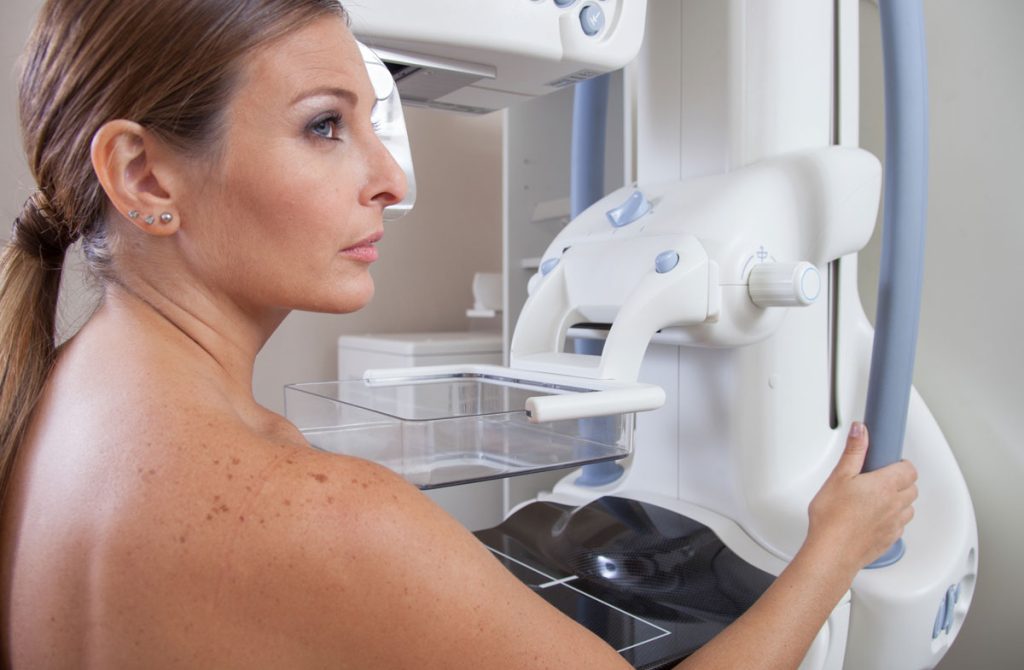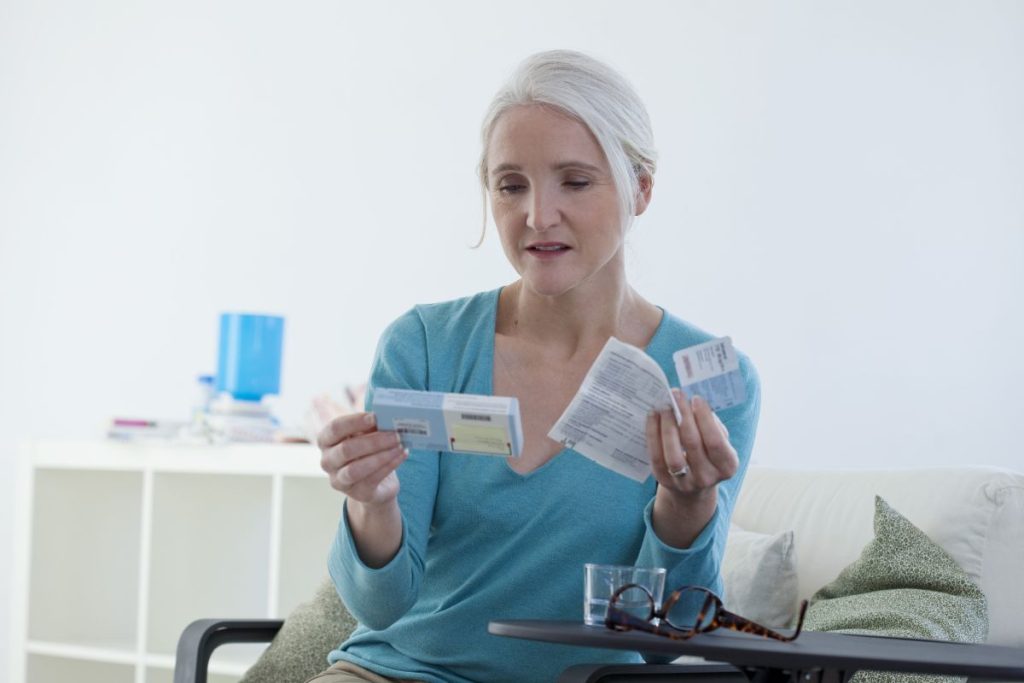Hormones! This one word conjures up many emotions in women and doctors. Some women can’t live without hormone therapy (HT), also known as hormone therapy (HT), and other women are concerned about the potential health risks. So, is hormone therapy a good option to balance your hormones during menopause? pausitive health breaks down the potential pros and cons, including the latest 2022 advice from The Menopause Society. Collaborating with a healthcare practitioner with expertise in this area remains essential to make the best decision for your particular situation at a given time.
What is hormone therapy (HT) for menopause?
Do menopause side effects have you looking for ways to balance your hormones? “Conventional” Western medicine often recommends hormone therapy (HT).
That’s when you take prescription medication to adjust various hormone levels that change significantly during the menopause transition.
HT can help women+ manage bothersome menopause symptoms, but it’s not your only option.
Types of hormone therapy
While we often talk about hormone therapy collectively, there are over 50 types of HT and various ways to take the medication. There are pills, patches, injections, creams, vaginal rings, sprays, gels, and vaginal tablets.
Food and Drug Administration (FDA) approved hormone therapy includes:
- Estrogen-only
- Progestin-only
- Combination of estrogen and progestin
- Combination of estrogen and other medications
There are also some brand names, specifically for estrogen-only hormone therapy. Consult the FDA’s guide for approved therapies and the overall risks associated with each type of HT.
No matter which type of hormone therapy is selected, the goal is the same. That’s to balance hormones to reduce menopause symptoms.
History of menopause
Hormone therapy became popular in the 1960s during the feminist movement.
Menopause was considered a hormone deficiency disease (NOT!) that was curable and preventable, and hormone therapy was the solution at the time.
Our understanding of menopause has changed over time. Women+ are asking more questions, setting expectations about how decisions are made, and taking control over their bodies during this normal stage of the female life cycle.
Menopause is not a disease that needs curing. It’s a natural life transition for which there are options to help and ease symptoms during the journey. The question is, “What’s the best way to manage menopause symptoms, which can last up to ten years or more?”
How to manage menopause symptoms
There are many ways to manage menopause symptoms, HT being one of them.
Hormones are the most effective treatment for vasomotor symptoms (hot flashes, night sweats, palpitations) and genitourinary syndrome or GSM (e.g., vaginal atrophy resulting in vaginal dryness and painful intercourse), according to The Menopause Society.
Some women also take hormones for sleep disturbances, urinary frequency, and reduced sex drive.
Other potential benefits include reducing the risk of osteoporosis by helping slow bone loss, building/maintaining muscle mass, helping with depression, and decreasing the risk of Parkinson’s and Alzheimer’s disease (mixed opinions in the medical community).
Studies show that HT may also provide some cardiovascular benefits, such as less atherosclerosis in blood vessels, which helps reduce the risk of heart attack and other conditions like stroke.
You have a choice. Hormones are not for everyone. Talk to your doctor about whether they are the right choice based on your symptoms, severity, and medical history.
Many women manage menopause symptoms with lifestyle modifications, non-hormonal prescription medications, and integrative treatment modalities such as mind-body therapies and herbal medicine, by choice or because they are unable to use HT because of the risks in their particular situation.
What are the signs you might benefit from hormone therapy?
Every menopause journey is unique. Some women+ report debilitating symptoms, while others consider them mild.
Think about the number, severity, and frequency of your symptoms. Are they making it difficult for you to do your job or go through your daily life? Then, hormone therapy may be something to explore.
Some symptoms improve as you progress through the menopause journey, but others can last for up to ten years or more, so consider the impact on your life.
Women+ often consider using hormones when suffering from symptoms like hot flashes, night sweats, bone thinning (osteopenia) or loss (osteoporosis), or vaginal dryness.
By treating these symptoms with hormones, you may experience other benefits like improved sleep, more satisfying sex, and a greater quality of life.
That’s because many menopause symptoms create a snowball effect on your body. For example, if you’re experiencing night sweats, you may not get enough sleep.
Sleep is already challenging during menopause, including falling back asleep after middle of the night awakenings, so night sweats worsen the problem.
If you don’t get enough sleep, you may be more susceptible to poor eating habits and reduced physical activity, leading to weight gain. During midlife, your metabolism slows down, so weight gain is already a concern for many menopausal women+.
You can see the snowball getting larger and picking up speed as it rolls downhill. One symptom can lead to other health concerns and unnecessary suffering.
There are specific guidelines for taking hormones to maximize the benefits and minimize the risks.
Talk with your doctor and understand the benefits, risks, and alternative treatment options. If your doctor only pushes hormones, consult another expert like an integrative physician whose training focuses on a more holistic picture of your health or a clinician with additional training in the management of menopause.
Know that hormones are not recommended for everyone. And, within the medical community and regulatory bodies, there is no consensus regarding the degree of risk and when HT is contraindicated.
Therefore, it is critically important that your healthcare practitioner individualize care, including the type of hormone(s) you take, dosing, and duration if you decide to move forward with an HT treatment regimen.
Is hormone therapy safe?
Like all medications, there are potential risks with taking hormone therapy.
Some were overstated due to a misinterpretation of the results from early studies decades ago, resulting in ongoing fear and/or reluctance to use HT by many women going through the menopause journey.
Hormone risks appeared on the radar for women+ and their providers in the 1970s, when they were first associated with an increased risk of endometrial cancer.
But the controversy that’s still brewing today stems from two studies in the early 2000s. U.S. and U.K. studies raised safety concerns about the risk of breast cancer, cardiovascular disease, blood clots, and stroke.
That sent women and their doctors into a tailspin. The use of hormone therapy plummeted. The Women’s Health Concern, the patient arm of the British Menopause Society, reported a 66% drop in hormone therapy.

Hormones and dementia risk
While the decades-old study is often the subject of most discussions involving the safety of hormone therapy, there’s also concern over the potential risk of dementia with its use.
Depending on the study, research in recent years has both supported and refuted the possibility of increased risk, once again leaving women with mixed study results.
Menopause impacts more than your ovaries. It affects your brain, too. Think about brain fog or the emotional rollercoaster, that so many women experience during the menopause journey.
Estrogen can influence the brain’s physiology.
A longitudinal study in Taiwan, published in 2022 in the journal Neurology, evaluated 35,024 women using hormone therapy and 70,048 women not using HT. The cumulative incidence of dementia for the women using HT was significantly higher than for those not using it.
Like seemingly everything else related to HT during the menopause transition with hormones, this 2022 study yielded different results than a large study in the United Kingdom from 2021. The study evaluated cases of dementia between January 1998 and July 2020.
It found women do not face an increased risk of dementia, regardless of the type of hormone treatment, age, or duration of its use.
However, that study found a slightly increased risk of developing Alzheimer’s disease for long-term users of combination estrogen-progestin therapy.
Previously, the Women’s Health Initiative Memory Study found an increased risk of dementia for post-menopausal women aged 65 years and older who were using estrogen plus progestin treatments.
The 2022 hormone guidelines from The Menopause Society state that HT in women older than 65 increases the risk for dementia.
Talk to your doctor before deciding if hormone therapy is right for you, and use the latest guidelines as a guide to making the best choice.
Hormones and RLS
HT can also worsen conditions, such as restless leg syndrome (RLS), which affects more women than men.
Researchers found that RLS is more severe in patients who take hormone therapy, but researchers did not find a connection between the use of HT and the prevalence of RLS.
GERD and HT
Women+ who take hormones may also be at risk for gastroesophageal reflux disease or GERD, according to a 2023 study published in Menopause. The symptoms are typically heartburn, difficulty swallowing, and chest pain.
The study reviewed five other studies published between 2008 and 2022 and found a “significant association” between using HT currently or at a previous time. The use of HT led to 29% higher odds of GERD.
Researchers noted that the results should be interpreted cautiously, but as a woman+, it’s important to know all the potential risks and talk to your doctor if a new symptom occurs during or after the use of HT.

Breast cancer risk
Approximately one in eight women get breast cancer in the U.S., so there’s an understandable concern about the risk with hormones.
The new guidelines suggest the risks are low with hormone therapy, even with a family history.
If you use hormones, follow breast screening guidelines, as the therapy can impact breast density, and you may need additional or different imaging than a routine 3-D mammogram.
It’s important to note the different types of hormone therapy. There are four main types: estrogen-only, progestin-only, combination estrogen and progestin, and combination estrogen and other medications.
Estrogen-only therapy typically only increases the risk of breast cancer after using it for more than ten years and can also increase the risk of ovarian cancer.

Can hormones reduce the risk of heart disease?
Like many other things with hormone therapy, there’s still some controversy over whether hormones provide a cardiovascular benefit.
Recent studies evaluate the “timing hypothesis,” which refers to whether women who just started the journey are more likely to experience heart healthy benefits from using hormones than someone who is a decade deep into the menopause journey.
You see that with some of the new guidance from The Menopause Society on hormone usage, which focuses on an individualized approach to hormone use.
The Menopause Society points out that CVD events occur less often in younger women than in older women taking hormone therapy for bothersome symptoms.
They recommend that women who are healthy, symptomatic, and younger than age 60 or within 10 years of the start of menopause should consider the favorable effects of hormone therapy on CVD and all-cause mortality against the potential rare increases in breast cancer, VTE, and stroke.
However, The Menopause Society also indicates that hormone therapy is not government approved for primary or secondary cardiovascular disease protection.

How to safely use hormones
Over time, guidelines have changed for the use of hormone therapy. In 2022, The Menopause Society issued a 28-page document detailing new guidelines based on recent evidence assessments. The Menopause Society still recommends hormone therapy as the most effective treatment option if you have no contraindications and you’re experiencing intolerable hot flashes, night sweats, and other VSM symptoms or genitourinary syndrome of menopause (GSM).
That refers to vaginal, sexual, and urinary changes. GSM symptoms may include vaginal dryness, burning, and irritation; sexual discomfort, lubrication changes, or impaired function; urinary tract infections and an urgency to urinate. GSM symptoms can impact intimate relationships and quality of life.
However, it’s not your only option. Some women+ try integrative modalities, too.
Updated Position Statement (2022)
The Menopause Society said in its 2022 position statement the risks vary based on the type of therapy, dose, duration of use, route of administration, the timing of initiation, and whether a progestogen is needed.
In The Menopause Society position statement detailed below, these takeaways stand out:
- Talk with your doctor about the risks and benefits of your situation, and re-evaluate the situation often.
- Hormone therapy is effective for the treatment of vasomotor symptoms and GSM. Risks vs. benefits may vary depending on your situation.
- Use the lowest, most effective dose possible.
- Age and time since menopause are critical.
- If you are younger than 60 years old and started menopause within 10 years, and you have no contraindications, the benefit-risk ratio is favorable for the use of hormones for bothersome vasomotor symptoms and the prevention of bone loss.
- If you are older than 60 years old, the benefit-risk ratio is less favorable. Why? There’s a greater risk of coronary heart disease, stroke, venous thromboembolism, and dementia.
- There’s a better safety profile for estrogen alone, and longer durations may be more appropriate.
The guidance is detailed and depends on your symptoms and specific situation. There may even be benefits for some women beyond easing symptoms.
Benefits
- It’s been shown to help prevent bone loss and fracture.
- It effectively treats vasomotor symptoms (hot flashes, night sweats, VMS) and GSM.
Evaluating Benefits and Risks
- Shared-decision making is key in the new guidance, along with a periodic reevaluation to determine if hormone therapy is the best option, given the risks and benefits.
- Use age and time since menopause to determine risks. The benefits outweigh the risks for most healthy women experiencing menopause symptoms who are younger than 60 and within 10 years of experiencing symptoms.
- Not all women have to stop hormone therapy between ages 60 and 65. Current guidance suggests you can use it past age 65 if you’re still experiencing hot flashes or other vasomotor symptoms, suffering from quality-of-life issues, or are focused on preventing osteoporosis. Again, talk with your doctor as part of the shared decision-making process, and regularly re-evaluate the use and types of formulations of hormones, as the risk-benefit ratio is less favorable (risks go up to achieve benefits) for this age group.
Cancer Risks
- The risk of breast cancer is not as high as once believed.
- Women should be advised of the risks, and they should be put into perspective. The risk is similar to the risks of having two alcoholic beverages a day, being obese, being sedentary, or operating at low physical activity levels.
- Hormones don’t necessarily add to the risk for women already at high risk of breast cancer due to family history.
- Hormone therapy can impact breast density, resulting in more mammograms or biopsies and potentially delaying cancer diagnosis.
Health Risks
- Women with premature or early menopause or primary ovarian insufficiency experience menopausal-type hormonal imbalances at an earlier age and are, therefore, at greater risk for health conditions like cardiovascular disease, bone loss, sexual dysfunction, cognitive and mood changes, and dementia over a longer period of time. The Menopause Society recommends hormone therapy for these women until at least the average age of menopause (51), or sooner if there is a contraindication to its use.
Bioidentical hormones
- Compounded bioidentical hormones are a safety concern since there is limited oversight and systemic quality control. Labels may not detail the risks, medication may be administered incorrectly, formulations may not be consistent or at appropriate dosages, and there are potentially greater contamination risks. Thus far, there’s a lack of scientific efficacy and safety data for bioidentical hormones.
Talk with your doctor and understand how your situation fits into the updated guidelines!
During a pausitive health webinar, our expert, Dr. Taniqua Miller, FACOG, MSCP, Founder of Revival Telemedicine discussed menopausal hormone therapy and the role of the Women’s Health Initiative.
Limits to the Initial Women’s Health Initiative Study Results (2022 evaluation)
The Women’s Health Initiative study sparked controversy over hormone therapy. The Menopause Society states in its position statement that it’s still the largest randomized controlled trial (RCT) in women 50 to 79 years old.
However, the trial was limited, using only one route of administration (oral), one formulation of estrogen, and one progestogen. Plus, the women for whom hormone therapy is currently recommended (women with vasomotor symptoms younger than 60 or who are fewer than 10 years from the start of menopause) were limited in the WHI trial.
Also, the study did not include women with early and premature menopause.
However, many of these shortcomings were not communicated effectively, resulting in decisions by both patients and their providers over several decades to severely limit the use of hormone therapy.
HT Recommendations and Research (2020)
Similar questions were raised about the women in the trial in 2020. We included this information so you can make a more informed decision with your doctor based on the totality of guidance over the years.
New research published in 2020, breaking down the same controversial 2002 studies, found HT may not be as risky as first thought, depending on a woman’s clinical status.
The new analysis raised questions about the health of some study participants and their use of hormone therapy.
The women in the Women’s Health Initiative (WHI) were more than a decade past their last menstrual cycle, raising questions about the trial results’ applicability to younger women.
There were other limitations, too.
Despite new analyses of the studies and updated recommendations, many women still worry that hormones are unsafe.
Studies are now evaluating the dose of estrogen, route of administration, timing after menopause, duration, other hormone effects, age, and pre-existing pathology.
If you decide to take that path, you should also talk to your doctor about these factors to find the best hormone therapy for your situation.
How long should you take hormones?
A big key to maximizing the benefits and minimizing the risks is starting hormones at the right time and knowing when to stop.
Hormone risks may outweigh the benefits if you’re 10 to 20 years past the start of menopause or you’re 60 or older, according to The Menopause Society. There’s a greater risk of coronary heart disease, stroke, venous thromboembolism (blood clots), and dementia.
The Menopause Society said you might consider continuing hormones beyond age 65 for persistent hot flashes, quality-of-life issues, or osteoporosis prevention. However, you should receive an appropriate evaluation and counseling about the risks and benefits.
The Menopause Society stated vaginal estrogen (and systemic if required) or other non-estrogen therapies are safe for vaginal dryness or other vaginal symptoms at any age.
When should you not take hormones?
According to the FDA, do not take hormones if you:
- have problems with vaginal bleeding
- have or have had certain cancers such as breast cancer or uterine cancer
- have or have had a blood clot, stroke, or heart attack
- have a bleeding disorder
- have liver disease
- have allergic reactions to hormone medicine
- think you are pregnant
Are bioidentical hormones safer?
Some women also consider – bioidentical hormones. These hormones have the same chemical and molecular structure as those produced in your body.
The American College of Obstetricians and Gynecologists says the FDA and Endocrine Society recognize the phrase bioidentical hormone therapy as a “marketing term” rather than a term based on scientific data.
You may hear these referred to as “natural” since they come from plants rather than lab-created synthetic hormones.
However, there are risks with bioidentical hormones.
Local pharmacies typically custom compound the bioidentical hormones, and regulations are lax. So, the hormones can vary from pharmacy to pharmacy, and formulations may not be optimal.
Bioidentical hormones are not FDA-approved, and there’s no scientific evidence that they’re safer or more effective.
What is compounding medication?
Traditionally, compounding helps patients who are allergic or intolerant to an ingredient or preservative in another treatment or when the necessary products are not commercially available.
ACOG points out that there is an FDA-approved progesterone treatment that contains peanut oil. If a patient is allergic, a custom compounded progesterone that does not have peanut oil may allow the patient to take the drug safely.
That’s an important distinction to make, because ACOG indicates that many bioidentical hormone preparations are far removed from these traditional uses of compounding.
Overall, ACOG says the evidence is lacking to support claims that bioidentical hormones are superior to traditional hormone therapy. In fact, they recommend conventional hormones over compounded ones.
Making the best choice to manage menopause symptoms
While it can be overwhelming to weed through all the analysis and guidance, some of which have changed over the years, it’s important to understand how hormone therapy has evolved.
Use your doctor’s knowledge and insight into the detailed findings and position statements to help guide your decision.
Know that hormones are not the only answer. You can try integrative modalities and lifestyle choices to ease menopause symptoms. Many women have great success with non-hormonal treatment options.
Understand the risks and benefits of each of your options. Remember, no menopause journey is the same. You’re on a unique path, so the best choice for your friend may not be the best one for you.
Find a doctor who listens and in whom you have trust. If you choose hormones, select the best possible method and the lowest possible dose needed to improve your symptoms.
Balance your hormonal body
Every menopause journey is distinct. Some women will have extremely challenging symptoms, and others will not so much.
Know you have options. You can try integrative modalities, lifestyle modifications, non-hormonal medications, and/or hormone therapy (if not contraindicated in your situation).
Make sure your treatment is as individualized as your menopause journey.
Don’t be afraid to ask questions and have a candid conversation about hormones with your doctor if you want to explore their use.
Don’t suffer silently and unnecessarily through menopause. You can make a change for the better.
Evaluate the risks and determine the best course of action – for YOU!
HRT: Benefits and risks | Women’s Health Concern
Menopause: Medicines to Help You | U.S. Food and Drug Administration
Cagnacci A, Venier M. The Controversial History of Hormone Replacement Therapy. Medicina (Kaunas). 2019 Sep 18;55(9):602. doi: 10.3390/medicina55090602. PMID: 31540401; PMCID: PMC6780820.
The 2017 hormone therapy position statement of The Menopause Society. Menopause: The Journal of The Menopause Society. Vol. 24, No. 7, pp. 728-753 DOI: 10.1097/GME.0000000000000921
Hormone Therapy: Benefits & Risks | The Menopause Society
Find a Menopause Practitioner | The North American Menopause Society (The Menopause Society)
Vogel L. Trial overstated HRT risk for younger women. CMAJ. 2017 May 1;189(17):E648-E649. doi: 10.1503/cmaj.1095421. PMID: 28461384; PMCID: PMC5415400.
Menopause: The Journal of The North American Menopause Society. The 2022 hormone therapy position statement of The North American Menopause Society. Vol. 29, No. 7, pp. 767-794 DOI: 10.1097/GME.0000000000002028
You may also like…

VEOZAH: Medical Breakthrough Gives Women+ More Hot Flash Treatment Options
VEOZAH (fezolinetant) is a new breakthrough medication for hot flashes, that’s non-hormonal. It can reduce the frequency and severity.

Feel Like You’re On An Emotional Rollercoaster? How To Survive Menopause Mood Swings
Are you experiencing mood swings, as if you’re on an emotional rollercoaster? Learn how to manage mood swings to improve your emotional health.

Bioidentical Hormone Therapy (HT): Is It Better Than Synthetic Hormone Therapy
Are you looking for alternatives to hormone therapy (HT)? Learn about the different types of plant-based bioidentical hormones and their risks and benefits.

